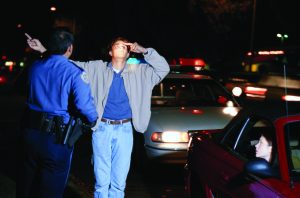 The National Highway Traffic Safety Administration (NHTSA) and the IACP periodically update the curricula for impaired driving enforcement training programs, including Standardized Field Sobriety Testing (SFST), Advanced Roadside Impaired Driving Enforcement (ARIDE), and the Drug Recognition Expert (DRE) School.
The National Highway Traffic Safety Administration (NHTSA) and the IACP periodically update the curricula for impaired driving enforcement training programs, including Standardized Field Sobriety Testing (SFST), Advanced Roadside Impaired Driving Enforcement (ARIDE), and the Drug Recognition Expert (DRE) School.
Subject matter experts from around the United States meet to identify ways to enhance the content and delivery of these important trainings. These revisions have occurred every few years since 1984, and the latest revision to these training curricula is being released this fall.
Many factors drive the need for revisions to law enforcement training, and the topic of impaired driving enforcement is no different. In the context of driving while intoxicated enforcement, changes in case law, new technologies, clarification of existing content, and new scientific revelations often lead to enhancements in training. Courts often cite the continuous review and revision of these courses as one of their assets as officers are kept apprised on the latest information. The IACP has always been part of these revision workshops as the association works closely with NHTSA on traffic safety with the goal of reducing the social harm caused by impaired motorists.
Expected Revisions
The SFST class remains the foundation for all impaired driving enforcement efforts. The IACP and NHTSA strongly encourage all officers to be trained in this class, either at the basic recruit academy or as advanced training. One of the most obvious changes in the SFST and other courses is the manual format. In the 2022 edition, slides have been condensed and the manual size reduced. Also in this edition, information has been added about the Mellanby Effect, which is a psychophysical phenomenon experienced by alcohol users as the blood alcohol level diminishes following a binge drinking episode.1 Other changes include producing new dry lab videos for instructor use in jurisdictions where the preferred method of using live drinking volunteers is not possible.
The ARIDE class is intended for all patrol officers who could be responsible for conducting impaired driving investigations. In larger agencies, students could be only patrol officers. In smaller agencies, they could be all sworn staff. Revisions to this class include additional information for participants regarding eye movements as signs of impairment, including lack of smooth pursuit, nystagmus, and lack of convergence—all of which can adversely affect driving ability. Illustrations of the effects these eye signs have on driving is now part of the curriculum to help officers articulate observed evidence of impairment in trial. An increased focus on, and information about, contemporary drugs was added to this course, as well as enhanced information on mental health crises that officers may encounter that could appear to be drug impairment. The IACP offers additional resources in this area through its One Mind Campaign.2 While officers completing ARIDE training are not certified, they do acquire important skills in recognizing the signs of drug impairment in drivers and can collect evidence that will be helpful for a DRE investigation.
Commonly, the majority of enhancements are made to the DRE School curriculum, and this revision is no different. Drugs of misuse continue to evolve, and this edition reflects the addition of newer drugs that have become popular for use. Drugs that have fallen out of common use have been removed and additional information has been added regarding the effects of cannabis and fentanyl on motorists. New research continues to provide the basis of physiology and drug effects, and, as requested by stakeholders, sources for much of the content in the DRE School have been added as references. While the DRE program has always been based upon knowledge and research of the physiological effects of drugs, including these sources in the curriculum further demonstrates the credibility of the material.
The IACP and NHTSA encourage police instructors to seek updated training on these courses to learn more. The International Standards for Impaired Driving Enforcement Training recommends that SFST instructors attend an instructor update course a minimum of once every two years, and SFST practitioners receive refresher training a minimum of once every three years.3 DRE School instructors and ARIDE instructors should follow their state coordinator’s guidelines on updated training.d
Notes:
1Michael G Holland, and Robin E Ferner, “A Systematic Review of the Evidence for Acute Tolerance to Alcohol—the ‘Mellanby Effect,’” Clinical Toxicology 55, no. 6 (2017): 545–556.
2The International Association of Chiefs of Police (IACP), “One Mind Campaign.”
3DEC Program Technical Advisory Panel, International Standards for Impaired Driving Programs (DRE, SFST, ARIDE) (IACP, 2022).
Please cite as
Kyle Clark, “Impaired Driving Enforcement Training Curricula Revisions,” IACP@Work, Police Chief 89, no. 10 (October 2022): 82–84.


